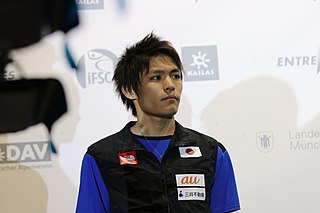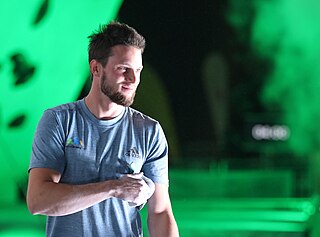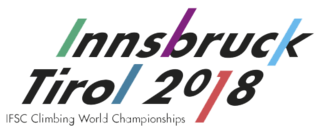Related Research Articles

The bouldering events at the 2015 IFSC Climbing World Cup took place in various countries between May and August of that year. The winners were awarded trophies, the best three finishers received medals, and prize money was awarded to the top six finishers at each stop. At the end of the season an overall ranking was determined based upon points, which athletes were awarded for finishing in the top 30 of each individual event. Akiyo Noguchi won the overall women's World Cup and Jongwon Chon won the overall men's World Cup.

The 2016 season of the IFSC Climbing World Cup was the 18th season of the competition. Bouldering competitions were held at the seven stops of the IFSC Climbing World Cup. The bouldering season began on April 15 at the World Cup in Meiringen, and concluded on 12 June at the World Cup in Munich. At each stop a qualifying was held on the first day of the competition, and the semi-final and final rounds were conducted on the second day of the competition. The winners were awarded trophies, the best three finishers received medals, and prize money was awarded to the top six finishers at each stop.

Akiyo Noguchi is a Japanese professional rock climber who specializes in competition bouldering as well as outdoor bouldering and sport climbing.

Tomoa Narasaki is a Japanese professional rock climber who specializes in bouldering and competition bouldering.

The 2018 season of the IFSC Climbing World Cup was the 20th season of the competition. Bouldering competitions were held at seven stops of the IFSC Climbing World Cup. The bouldering season began on April 13 at the World Cup in Meiringen, and concluded on 18 August with the World Cup in Munich. At each stop a qualifying was held on the first day of the competition, and the semi-final and final rounds are conducted on the second day of the competition. The winners were awarded trophies, and the best three finishers received medals. At the end of the season an overall ranking was determined based upon points, which athletes were awarded for finishing in the top 30 of each individual event. Jernej Kruder won the seasonal title in the men's competition and Miho Nonaka won the women's. Japan won the national team competition.

The 2017 season of the IFSC Climbing World Cup was the 19th season of the competition. Bouldering competitions were being held at seven stops of the IFSC Climbing World Cup. The bouldering season began on April 7 at the World Cup in Meiringen, and concluded on 19 August at the World Cup in Munich. At each stop a qualifying was held on the first day, and the semi-final and final rounds were conducted on the second day of the competition. The winners were awarded trophies, and the best three finishers received medals. At the end of the season an overall ranking was determined based upon points, which athletes were awarded for finishing in the top 30 of each individual event. Shauna Coxsey won the women's World Cup and Jongwon Chon won the men's World Cup.
There were 40 quota spots available for sport climbing at the 2020 Summer Olympics. Each National Olympic Committee (NOC) could obtain a maximum of 2 spots in each event. Each event had 20 competitors qualify: 18 from qualifying, 1 from the host (Japan), and 1 from Tripartite Commission invitations.

The 2018 IFSC Climbing World Championships, the 15th edition, were held in Innsbruck, Austria from 6 to 16 September 2018. The championships consisted of lead, speed, bouldering, paraclimbing, and combined events.
The 2014 IFSC Climbing World Cup was held in 16 locations. Bouldering competitions were held in 8 locations, lead in 8 locations, and speed in 7 locations. The season began on 26 April in Chongqing, China and concluded on 16 November in Kranj, Slovenia.
The 2012 IFSC Climbing World Cup was held in 17 locations. Bouldering competitions were held in 6 locations, lead in 9 locations, and speed in 6 locations. The season began on 13 April in Chongqing, China and concluded on 18 November in Kranj, Slovenia.
The 2009 IFSC Climbing World Cup was held in 14 locations. Bouldering competitions were held in 5 locations, lead in 6 locations, and speed in 4 locations. The season began on 11 April in Kazo, Japan and concluded on 15 November in Kranj, Slovenia.
The 2008 IFSC Climbing World Cup was held in 15 locations. Bouldering competitions were held in 7 locations, lead in 6 locations, and speed in 6 locations. The season began on 18 April in Hall, Austria and concluded on 16 November in Kranj, Slovenia.
The 2019 season of the IFSC Climbing World Cup was the 21st season of the competition. Bouldering competitions were held at six stops of the IFSC Climbing World Cup. The bouldering season began on April 5 at the World Cup in Meiringen, and concluded on June 8 with the World Cup in Vail. At each stop a qualifying was held on the first day of the competition, and the semi-final and final rounds were conducted on the second day of the competition. The winners were awarded trophies, and the best three finishers received medals. At the end of the season an overall ranking was determined based upon points, which athletes were awarded for finishing in the top 30 of each individual event.
The 2019 Combined Japan Cup was the second of the competition. It was organized by the JMSCA. It was held from 25 to 26 May 2019 in Saijō city, Ehime Prefecture. The athletes competed in combined format of three disciplines: speed, bouldering, and lead. The winner for men was Tomoa Narasaki and for women was Miho Nonaka.

Futaba Ito is a Japanese professional rock climber, sport climber and boulderer. She participates in both bouldering and lead climbing competitions. She won the IFSC Climbing Asian Youth Championships in lead and bouldering events in 2016, as well as Bouldering Japan Cup in 2017. She participated in combined and speed events at the 2018 Asian Games.

Ai Mori is a Japanese professional rock climber who specializes in competition lead climbing and competition bouldering.
The 2021 Combined Japan Cup was held from 18 to 19 June 2021 in Morioka city, Iwate Prefecture. It was organized by the JMSCA. The athletes competed in combined format of two disciplines of bouldering and lead, simulating the 2024 Paris Olympics format. The winner for men was Tomoa Narasaki and for women was Akiyo Noguchi.
Competition lead climbing at the 2019 IFSC Climbing World Cup was held over six stages at six different locations, from 4 July to 27 October 2019. The top three in each competition received medals, and at the end of the season, the overall winners were awarded trophies. The overall winners were determined based upon points, which athletes were awarded for finishing in the top 30 of each individual event. Adam Ondra won the men's seasonal title, Chaehyun Seo won the women's seasonal title, and Japan won the national team title.

Sorato Anraku is a Japanese rock climber who specializes in competition lead climbing and competition bouldering. In 2023, Anraku became the first climber to win both the Lead Overall World Cup and Boulder Overall World Cup in his debut senior season. He also won the gold medal in the combined boulder and lead event at the 2022 Asian Games, held in October 2023. He won the silver medal in the combined boulder and lead event at the 2024 Summer Olympics.

Monika Retschy is a retired German competition climber, who specializes in competition bouldering. In 2013, she won the German Championship for the sport.